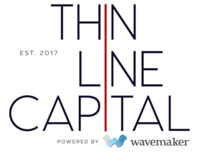Wednesday, October 9, 2019
Aaron Fyke, Thin Line Capital: The Second Wave Of Cleantech Investing

There's a new opportunity in clean technology investments, according to venture capitalist Aaron Fyke, the head of a new, Pasadena-based venture capital investment fund, Thin Line Capital (www.thinlinecapital.com). Thin Line--formed in partnership with LA's Wavemaker Partners--is hoping to take advantage of the growth in the clean technology market to find startups able to tapping into those now established markets, without the huge investment requirements of those first wave of clean technology companies. We spoke with Aaron--a veteran of both clean technology investing, as well as former CEO of a number of clean technology companies here in Los Angeles--on the new fund.
Talk about the new firm and the new fund?

Aaron Fyke: I believe we're in a second wave of clean tech investing. Cleantech had an enormous rise and fall between 20006 and 2009. Therewere lots of people interested in the size of the markets for the clean energy economy then, and lots of startups that got funding during that time. However, they all required an enormous amount of money to build out their products, and lots of those companies were disappointments. Lots has changed since 2009. We're now seeing a number of companies that don't require the same amount of money or capital that previous companies needed, and are a much better fit for venture capital. The clean tech industries like solar, wind, battery storage, and electric cars are all now well built out, which just wasn't the case ten years ago. There are now a lot of opportunities for startups to sell into these markets, making those startups a better fit for a typical venture capital fund. It's the realization that things had changed, and that there was an opportunity again to invest in these companies. Our target is energy and sustainability companies. Sustainability is a very broad tent, and that includes areas like agriculture, water, and building materials and energy efficiency. I'm primarily focused on energy, and a little bit on agriculture and a little bit on water, all things I know something about. There are other, tremendous opportunities in such areas as organic farming, but those are outside of my area of knowledge and areas I wouldn't focus on. I'm also interested in technology companies, in data analytics, and low CAPEX hardware.
Talk a bit about your background in this area?
Aaron Fyke: My background is mechanical engineering. I was involved in what would be cleantech back in the mid 90's, with electric vehicles and fuel cells. I actually came to Pasadena in 2002, to work on electric vehicle and ocean power technology, before there was a whole lot of interestin this area. After that, I had the opportunity to move to Australia in 2007, and joined a venture capital firm called Starfish Ventures. In 2007, the cleantech excitement was in full swing. Starfish was very interested in the space, and I spent a couple of years in Australia looking for opportunities in energy and water. I ended up investing in a company, and moved to California to work with Ausra, the utility scale solar energy company backed by Kleiner Perkins and Khosla Ventures. In 2009, the finance world fell apart, and the venture world fell apart, and I returned to Pasadena. I first joined the Xprize Foundation, and later got together with Bill Gross at Idealab, where I ended up working as CEO for a number of companies in energy storage, with Energy Cache, to Edison Microgrids, and also was involved in a variety of other things Idealab was doing at the time. In the last couple of years, I noticed there was this opportunity to again invest in cleantech companies, using a different investment thesis, and wanted to get back into the investor role. So, I shifted by work at Idealab to be an advisor and consultant, and began putting Thin Line together, which has now had its first raise.
What did you learn from having gone through that first clean tech boom bust?
Aaron Fyke: It's really funny. To give you an example, with Austra, the round we invested in was $60M, and this wasn't atypical. Esolar raised over $100M, and SolarReserve had similar numbers, on top of stimulus money and loan guarantees.I think there ended up with mult-hundreds ofmillions given to BrightSource. The same thing happened with algae biofuel companies in the 2006 and 2009 time frame. This is not a typical, venture capital investment. Those $60M rounds really don't fit the venture capital model. Looking back at that, and what has changed, I realized we've seen a lot of parallels with the dot com era. In the 90's, there was an enormous excitement and hype, but not that many people actually using the Internet. Markets were not yet built out. You had companies like Webvan, who were spending enormous amounts of money building out infrastructure. They spent a lot of money building markets that didn't yet exist, and then things fell apart. It ended up, the best time to invest in dot com companies were in the 2004 timeframe. You then caught things like Web 2.0, social media, and everything else. Back when I was doing energy investing in 2007, there were only 7 gigawatts of solar power world wide. Now, there are over 500 gigawatts. Then, the only billion dollar businesses were new solar technology and greentech media. There were 110 venture-backed solar companies that failed, and what ended up winning the day was the big manufacturing machine in China turning on and driving costs down. Those were not VC-appropriate investments. Biofuels companies were also a disappointment, because it took such a long time to exit. Even Tesla tooks I think 7 to 8 years to exit, and that was one of the successes, whereas now, if you want to do something like low capex, cloud-based solar monitoring, or analytics, there's plenty of opportunities—back then, there was no solar to sell into. Now, companies don't have to build out the solar market, or the EV market, or the wind industry, you can sell into and service those existing industries. That requires a whole lot less money, and opens up business models which were just not possible ten years ago. Those companies don't need to deploy as much capital, just like now, with the Internet, there are now lots of users you can reach. It's the same in clean tech, where three are now plenty of solar panels and electric vehicles deployed, and there are a sufficient quantity of customers you can service and established markets, not like it was ten years ago.
What's the ideal entrepreneur and technology for your fund?
Aaron Fyke: It has to be an area I know well. I want to play an active role in every one of of my investments, so I want to know how I will bring value to the investment. That's a narrow space, energy and a little bit of food and water. There are really a lot of really amazing chemistry-based companies, for example, which are just outside of my area of expertise, so I couldn't get involved. However, within the space I'm looking at, one of the biggest challenges in the energy market, and with energy technology companies, is not necessarily the technology. It's market adoption. It's selling into auto manufacturers, or utilities, or power generation companies. The size of the market is really attractive, but getting into that market is difficult, because they're very conservative markets. What is most important, is the expertise working with, or understanding the customer you will eventually be selling into. People who originally worked for the public utility market, for industrial companies are great, even if those companies are not known as a hotbed for startup innovation. There are really smart people, with good industry knowledge, who want to move into the startup space to serve those markets. Rather than a technology company trying to band their head into a wall, selling into a market that is hard to penetrate, market knowledge is really important. The third thing which is important, is the thesis is that there are now low CAPEX opportunities, and companies that don't require enormous amounts of capital. I'm not saying there's not good market opportunity for those companies, but there are other funds which are a better fit for the long development of a new battery chemistry or new hardware technology. I'm looking for companies who are much closer to market adoption, or who have already started engaging customers in a limited way with trials. We want to see at least some engagement with customers, to see how their end customers might be interested and on possible adoption. The biggest heartache with the clean technology industry, is that there is often great technology that exists, but for various reasons, large industrial customers have been reluctant to adopt them, so that technology sits idle.
What advice would you give to clean tech entrepreneurs looking for funding, in general?
Aaron Fyke: The biggest concern that myself, and a number of other funds entering this space again, is there needs to be a good opportunity now. The majority of investors still need convincing that energy, sustainability, or cleantech isn't like it used to be. That's because investors only remember after any sector has a big boom and a crash, and they're often reluctant to re-enter those markets. I'm convinced it's not like it was before, and I think we've demonstrated that nobody needs to be told the market opportunity is multi-billions. What investors are interested in, is not that it's a billion dollar market, but tell me about your first dollar. Show me that you have a path, that you're not boiling the ocean, that you don't have to build this enormous thing before you're making money. I want to know that you can serve real customers, immediately, without too much development into the future. I want to know that what your doing is really valuable now to customers. What happens with customers, and this is particularly true of energy and industrial customers, is once you say you're working with this or that manufacturer, say you're doing a pilot with GE, the brand of your existing customer unlocks the doors to new customers. They want to use what they are using. It's similar to enterprise software, where there's a reluctance of corporations to adopt something, unless they see they're not the only one adopting it. You need to show investors how you are going to use their limited VC dollars. As a prior entrepreneur, you never have as much money as you want, and you have to be careful on where you spend your money. You have to show you can begin to get market traction as soon as possible. Even if you're not making enough money to fully run your company, and aren't cash flow positive, customer adoptions makes new investors and new customers more confident about buying. So, getting that first initial customer traction is the most important thing to focus on.
Thanks, and good luck!